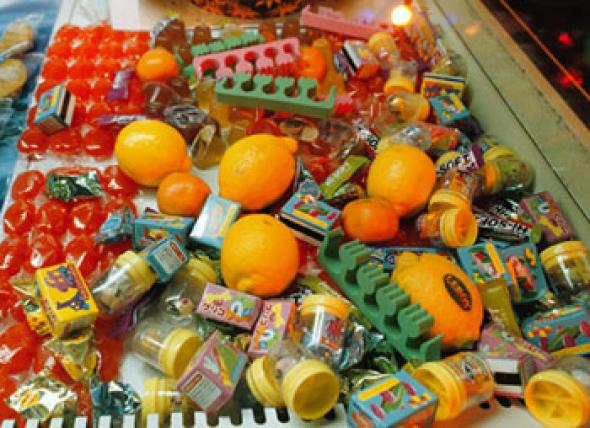Exploding Convergence, Converging Explosions
Last year Rotterdam's Exploding Cinema festival surfed in on the crest of a digital wave. This year at v. 2.0 - Jap.Pop.Tech - Chris Darke asks how far surfers can really go.
As terms for the ever-proliferating, cross-fertilising, sheer damn omnipresence of contemporary media, ‘convergence’ and ‘explosion’ appear to coexist in a paradoxical tension. The Exploding Cinema section of the Rotterdam Film Festival has, over the last few years, explored the ways in which the experience of cinema could be said to have ‘exploded’ beyond the straightforward ritual of bums-on-multiplex-seats into manifold encounters with the moving image in any number of different sites. The cinematic has, without doubt, been ‘exploded’. But where have the fragments settled? And how does the debris collect in the culture? And what does it mean to be a spectator now?
Exploding Cinema plays on the phrase ‘Expanded Cinema’, coined by the American avant-garde film critic of the 60s and 70s, Gene Youngblood. But where Youngblood was looking to extend the boundaries of movie-going from consumerist reflex to experiential mindfuck, the sense now is that cinema, along with its practitioners, theorists and cinephile clerics, is trying to catch up and reassert its primacy as story-telling giant in the brave new world of multi-media experience, where next week’s account of media convergence is never quite the same as this week’s. Last year, Exploding Cinema took the digital genie by the horns in an attempt to wrestle it back into a cinema-shaped bottle. And if these metaphors appear indiscriminately mixed, they evoke the confusion of forms and technologies that were unleashed. But it made for a provocative, eye-opening, agenda-setting affair. And while there was no shortage of corporate-sponsored hucksters claiming themselves as digital visionaries and putting the cyber-theoretical spin on such 21st century delights as ‘Event dining’ (which is what precisely? a live hologram of Marco Pierre White bawling out his head saucier?), there was enough work to be seen to get the measure of what digital cinema might just be.
This year, Exploding Cinema was exclusively Japanese in focus, offering a cornucopia of ‘Poptech’ styles that took in everything from manga to games via digital design and graphics. In her introduction to the festival catalogue, Exploding Cinema curator Femke Wolting asserted: "If there is one country for which the definition of Exploding Cinema seems to have been invented, it is Japan, especially Tokyo." And with a keen sense of cultural irony, a ‘Poptech Lounge’ had been installed in the seedy charm of Rotterdam’s Corso cinema; a neo-Tokyo in miniature, its walls crawling with a hallucinatory range of imagery low tables housing all manner of games. Hell, they’d even gone the whole kitsch, pseudo-Japanese nine yards by having a couple of Sushi bars at hand. It had something of the feeling of an utterly hip trade fair but even that couldn’t quite overcome the distinct feeling of otherness that much of the work, whether ads or avant-garde animation, carried with it.
For as much as Wolting can confidently state that "Thanks to the developments of technology, a world-wide popular culture has developed…all over the world people share the same interest in films, games, art and music, in sport, food and fashion," what remains is the irreducible Japaneseness of the visual culture that the generation known as ‘The Sun Tribe’ has developed. In their image-vernacular, the post-war boom-babies of Basho and Sony combine haiku with hi-tech. Which is to say that, among all the corporate talk of a one-world pop-culture (what the American writer Thomas Frank calls ‘the conquest of cool’), JapPopTech still retains and strongly expresses something that might be called national identity.
Strangely enough, this is exaggeratedly visible — in all its simultaneous specificity and ambiguity, its globalised local resonance — in a publication called Tokion Magazine. Basically promotional literature for that notable champion of cutting-edge pop culture, Macdonalds, it’s a weirdly ultra hip exercise in corporate ingratiation. Moody Tokyo youths lounge in attitudes of soft-focus insouciance; phrases in Japlish make muted appeals to get a sushi-burger down your neck. All of it is delivered in impeccable Poptech style. Which makes one wonder: is this a pop culture that has come, of its own accord, to a complete accommodation of corporate capitalism? Or perhaps it never had a problem with it in the first place. Poptech, as showcased in Exploding Cinema, is an eternal playground, a model for perfect pastiche. Witness the remarkable animations for Vibe Beer which unspooled in a loop in the transformed Corso Cinema — like watching a compressed history of animation — scratchy pen and ink, pseudo-constructivism, staggeringly sophisticated digital animation and that strange combination of peachy sentimentality and visceral brutality that is a mark of Japanese pop culture, whether 60s Yakuza movies or 90s Poptech. But, as with a quarter-pounder, you might find you crave something a little more substantial shortly afterwards.
Chris Darke <chris AT metamute.org
Mute Books Orders
For Mute Books distribution contact Anagram Books
contact@anagrambooks.com
For online purchases visit anagrambooks.com








